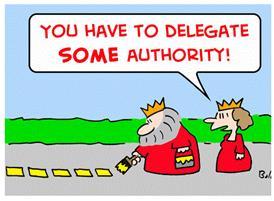One of the current buzzwords in leadership development seems to be the idea of “teachable moments.” That is, helping a direct report learn from a practical, job related experience as it occurs. An example of a teachable moment that I was able to highlight for an individual I was coaching may shed some light on how to capture these valuable moments. This excerpt is from a previous blog post.
Enough Already – Delegate (or Just Let Go!)
Author: Diane Hamilton, Date: 5/9/2013 I’ve been fortunate to work with many very good leaders over the years. Those who have been most successful have worked hard to surround themselves with good people. They also know that it takes more than having good people around you—it’s about tapping into and developing that talent that makes the difference.
I’ve been fortunate to work with many very good leaders over the years. Those who have been most successful have worked hard to surround themselves with good people. They also know that it takes more than having good people around you—it’s about tapping into and developing that talent that makes the difference.
Why Did You Become a Manager?
Author: Paul Dillenburg, Date: 5/1/2013Many employees become managers out of necessity. They were great individual contributors so their organizations’ promote them into a position that requires them to manage others. For the employee, one day you’re responsible for your individual results, the next you’re responsible for the results of others.
Through our coaching interactions we often ask, “why did you become a manager?” or “why should your direct reports follow you?” Seemingly easy questions, but difficult to answer the more you reflect on them.
Treat Everyone as a Game Winning Player
Author: Diane Hamilton, Date: 4/11/2013I’m a big college basketball fan. I love March Madness and despite the experts discussions about how the game is hard to watch today (for a variety of reasons), I enjoy the pageantry and competition. You may not be a Louisville fan, but you can’t deny the coaching prowess of Rick Pitino. Elected into the Basketball Hall of Fame on the same day he became the first coach to win national championships at two universities, Pitino is also no stranger to the concept of leadership.
Take Time to Appreciate
Author: Diane Hamilton, Date: 3/28/2013 Snowstorms…spring thaw…freezing rain. Huge fluctuations in weather are quite common in the Midwest. If you’ve lived or traveled in this area you are well accustomed to it.
Snowstorms…spring thaw…freezing rain. Huge fluctuations in weather are quite common in the Midwest. If you’ve lived or traveled in this area you are well accustomed to it.
What struck me during a recent cold spell is how easy it is for some people to focus on the negative instead of appreciating what’s in front of them. The robins are back—scratching for food through what remains of the winter snow. The crocuses and daffodils are poking their way out of the still frozen ground. Yet, what I’ve heard from a lot of people is the negative reaction to our slow turning spring (i.e., “I’m SO sick of winter”). While this is understandable as temperatures remain chilly, it prevents people from appreciating what is around them and recognizing the beauty that is at hand.
On-the-Job Skill Development
Author: Paul Dillenburg, Date: 3/20/2013In a recent client interaction I received a question regarding how to provide direct reports with on-the-job skill development. This reminded me of a previous blog I had written on the subject, so I thought I would re-post:
A couple of months ago, I was involved in a group discussion focusing on building capabilities in young managers. One of the points of emphasis within the group was that new managers (and some senior leaders) thought of development as a formal program designed and delivered by the organization (e.g., mentor programs, training). Given the budget cuts many organizations are facing, group participants wanted to know what they could do to develop young talent.
Development Planning? Focus on Strengths…Close Development Gaps
Author: Diane Hamilton, Date: 3/14/2013“People can do great things. However, there are some things they just CAN’T do. I, for instance, have not been able to transform myself into a Popsicle, despite years of effort.” — Brandon Sanderson, American fantasy author
Much has been written over the past several years about focusing on one’s strengths. Thousands of individuals at all levels in organizations have taken the StrengthsFinder® survey. For those unfamiliar, the StrengthsFinder® is an assessment that reveals dominant “themes” that help people focus on their strengths and abilities and focus their work and lives around them. The premise is that it makes more sense to leverage our strengths and talents versus trying to overcome shortcomings.
The Struggle to Define Work
Author: Paul Dillenburg, Date: 1/17/2013How do you define work? If you are like many individuals, your responsibilities have expanded since you first joined the workforce. As you have progressed through your career, you most likely have gone from an individual, task-based definition of work (i.e., completing x number of tasks, producing x number of widgets) to a more team-based approach to work, meaning, transitioning from producing results as an individual contributor to producing results through others. For many of us, the transfer from task-oriented to team-oriented work occurs suddenly with a promotion to supervisor or manager.
Step Outside Your Comfort Zone
Author: Diane Hamilton, Date: 11/6/2012“Move out of your comfort zone. You can only grow if you are willing to feel awkward and uncomfortable when you try something new.” —Brian Tracy
When is the last time you pushed yourself out of your comfort zone?
If you are a new leader you may be answering, “every day.” For those who are more seasoned, you may have to stop and think about the last time that you felt “awkward” or “uncomfortable.”
Lack of Communication?
Author: Paul Dillenburg, Date: 10/11/2012Over the last 16 years, we’ve conducted a myriad of assessments for our clients. Whether 360 degree feedback, culture studies, team assessments, or employee opinion surveys, we often hear about a “lack of communication” within the organizations we work with. My guess is within the organization you work you hear that there is a lack of communication as well. But what does this actually mean? Does anyone in your organization know?




